“A room without books is like a body without a soul”
Marcus Tullius Cicero

OK, here it is, the inaugural Weekend Bookshelf. Welcome! Every week I will be discussing and reviewing books, along with some (hopefully) profound insights about things book related. My plan is to post the Weekend Bookshelf every Sunday morning. Comments and suggestions are always welcome.
Modern Literature
In my younger years I was big into fiction and literature, but as I’ve gotten older I’ve come to the realization that I don’t read much fiction anymore. Not sure exactly why that is. I used to read a ton of science fiction in my teens and twenties. There was a period in my later twenties and in to my early thirties that I read a lot of the American classics and a few contemporary (at the time) authors. My favorite classic authors were Hemingway and Steinbeck. I liked Steinbeck’s short stories anyway, not such a big fan of his novels. Jim Harrison was my favorite modern author.
Now I read zero contemporary literature. None. Nada. Zip. As far as other fiction goes, I am down to about 2-3 current sci-fi authors and maybe one or two mystery writers.
Perhaps my lack of interest in modern literature stems from some of the literary works of the authors who supposedly represent “my” generation: the tail-end Baby Boomers. Authors such as Brett Easton Ellis (Less than Zero) and Jay McInernery (Bright Lights, Big City) were called the “voices” for those of us who came of age in the late 70’s and early 80’s. What horsecrap.
My problem with these guys is that almost all of their writing is set in big coastal urban areas (mostly New York, but sometimes in Los Angeles) and are very nihilistic. Nothing quite like reading about rich city kids with no sense of purpose whining about how life is such a bitch. Steinbeck told the stories of Americans from all strata of society. Hemingway wrote about disaffected Americans buffeted by the changing cultural norms of post WWI society. With “On the Road”, Jack Kerouac captured the frenetic energy and expanded opportunities of post WWII America. My generation’s “representatives” wrote about cocaine binges and drunken orgies. Not a whole lot there for me to relate to.
Or maybe it’s just that the majority of modern literature is just plain crap. Who knows. Either way, my reading these days is primarily non-fiction: history, travelogues and biographies. Which brings us to this week’s book review, a comprehensive history of the U.S. Army in the European Theater of the Second World War.
From the Nightstand:
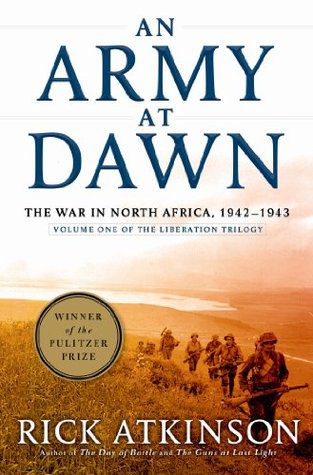
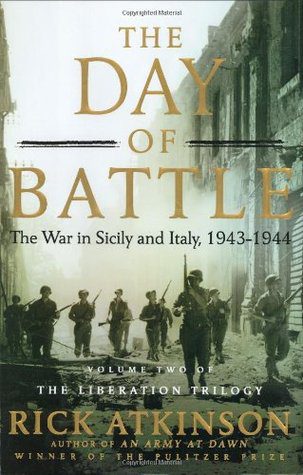
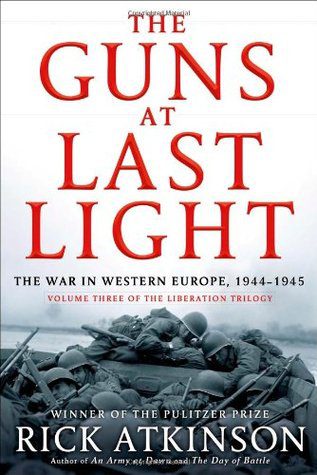
I recently finished Rick Atkinson’s Liberation Trilogy (An Army at Dawn, The Day of Battle and The Guns at Last Light). Outstanding read! Mr. Atkinson’s trilogy is a sweeping history of the U.S. Army in the North African and European theaters during the WWII.
An Army at Dawn starts with the lead up to the Allies amphibious landings (code named Torch) at French North Africa. It shows how woefully unprepared the soldiers and their military leaders were during the early years of America’s involvement in the war. Gradually the Army learns hard lessons on how to win a war in the harsh environment of North Africa.
The Day of Battle picks up after the North Africa campaign is won, and covers the Italian campaign. Starting with the initial landings at Salerno in 1943, the book closes when the Allies liberate Rome on the fifth of June, the day before the Normandy D-Day landings. This book describes how the Army had to learn new lessons (and re-learn lessons taught in North Africa at a terrible cost), as well as dealing with the growing strain on the Alliance as America took a larger role in running the war.
The Guns at Last Light, as you can imagine, starts right before the D-Day landings in France and goes to the end of the war.
Mr. Atkinson covers a lot of ground in the trilogy, from military movements to the (outsized) personalities of military and civilian leaders of all the major combatants. He is both fair and at the same time unsparing. He gives credit to leaders such as Eisenhower, Patton, FDR and Montgomery for their outstanding qualities, but doesn’t hesitate to draw attention to their flaws and weaknesses.
He brings that same attitude to the Army itself. He describes the heroism and sacrifice of those who fought, but also points out the stupid mistakes and missed opportunities that the Army made over and over again. The U.S. Army went through a lot of growing pains during the war. It went from being the 17th ranked army in 1940 (behind Poland) to the second largest land force in the world by 1945 (only the USSR’s army was bigger). The soldiers and their leaders had to learn lessons the difficult and bloody way; by hard won experience.
The only flaw in these books in my eyes is the way quotes are attributed to enlisted personnel. For obvious reasons the names of major military and civilian leaders are attached to their quotes. Further down the chain of command, the first time an Army officer is quoted, his rank (Major, Colonel, etc.) is given along with his name and often a very brief bio is included. Where he was born, who he was married to and maybe his career inside or outside of the military. From that point on, his name is given next to his quote.
Enlisted men on the other hand, with the exception of famous ones such as Audie Murphy, are simply their rank. No names, no background. Just faceless exposition: “a Private said [something pithy]” or “a company 1st Sergeant said [something profound]”. As a former enlisted man, I found this irritating.
That’s a minor complaint. I highly recommend this series because of it’s in-depth and easily readable history of the U.S. Army in the North Africa and European theaters. If I had 4 thumbs I’d give it 4 thumbs up.
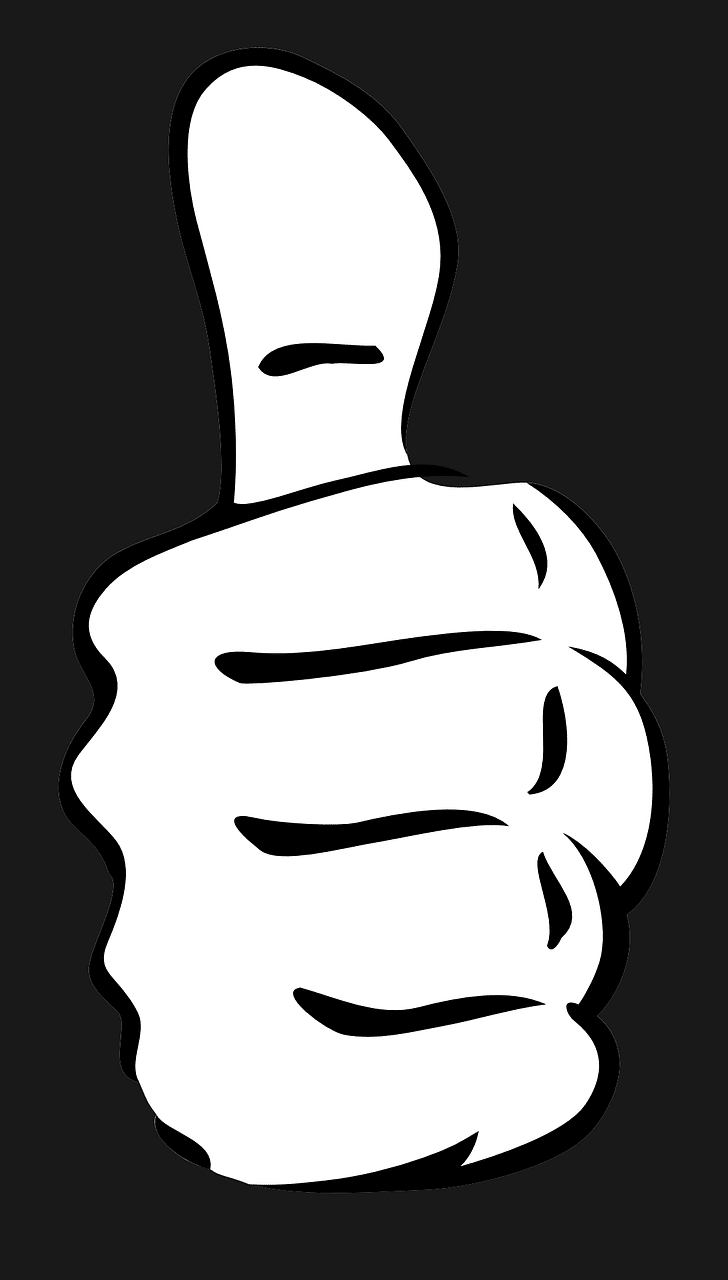



On the Bookshelf:
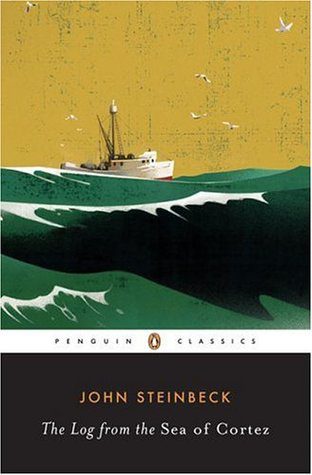
I currently am reading far too many books at the same time. I’m knee-deep into “The Mighty Eighth”, “The Rise of Athens” and “The Worry Trick”. I’ve also got “Dodge City” and “Wings over Water” sitting on my nightstand partially read. Because I’m jumping from book to book none of them is getting finished.
Still, there will always be books on my shelves or the bookstore’s shelves or the library’s shelves that catch my covetous eyes. The book that is currently drawing my attention is one I’ve had for a couple of years but haven’t gotten to yet. It’s John Steinbeck’s “The Log from the Sea of Cortez”.
I mentioned above that I am a fan of Steinbeck’s short stories. I am especially fond of “Cannery Row”. One of my all time favorite fictional characters is Doc, the intelligent and enigmatic marine biologist central to the story.
Doc was based on real life marine biologist, Edward F. Ricketts, who was a friend of Steinbeck. In 1940, Steinbeck and Ricketts took a sardine boat called the “Western Flyer” on a 4000-mile journey down along the Baja Peninsula and into the Sea of Cortez, ostensibly to collect specimens from beaches and tide pools for research specimens. “The Log of the Sea of Cortez” is Steinbeck’s journal of their adventure.
Once I finish up a few of my current reads, “The Log of the Sea of Cortez” will be the next book to find a spot on my cluttered night stand.
From the Readers:
So, read any good books lately? Any you might want to recommend? Feel free to leave a comment. If you’re shy, you can send me an email at Mrvintageman2@gmail.com and I’ll pass along the recommendation for you.
Have a great week! Remember, stay safe out there.

